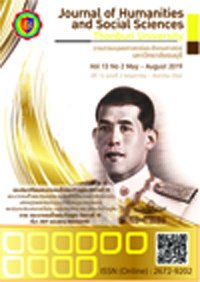THE MODEL OF COMPETENCY FOR PRIVATE SCHOOL LEADER TOWARDS THE INTERNATIONAL STANDARD
Keywords:
Model, Competency, Private School Leader, The International StandardAbstract
The objectives of this research were 1) to study the components of leadership competencies in private schools, 2) to the model of developing leadership competencies in private schools, and 3) to evaluate the model of leadership competencies towards international standard. The methodology was divided into three steps. The first step was the study on the components of leadership competencies in private schools. Data were collected by interviewing 3 experts and conducting a focus group discussion with 36 individuals. The second step was the development of the model of leadership competencies in private schools. The key informants consisted of 168 school board representatives, teacher representatives, parent representatives, student representatives. The third step was the evaluation of suitability, feasibility, and utility of the model of leadership competencies in private schools. Workshop was conducted with 6 experts. Assessment for the model of leadership competencies in private schools was used. Data were analyzed by using statistics including percentage, mean and standard deviation.
The results of this research showed that there were six components of leadership competencies in private schools towards international standard, including 1) Idealized Influence, formulating the school direction towards desired outcome, 2) Inspirational Motivation, stimulating personnel to achieve the visions and missions, 3) Intellectual Stimulation, stimulating personnel to apply the knowledge, 4)Idealized Influence, building the relationship and engagement, 5) Contingent Reward, rewarding personnel based on project/ activity plan to achieve the school’s vision and goals, and 6) Management-by-Exception, formulating the standard towards organizational goal. The results of evaluating the model of leadership competencies in private schools showed that all aspects of the model met the criteria.
References
คณะกรรมการการศึกษาแห่งชาติ, สำนักงาน. (2545). พระราชบัญญัติการศึกษาแห่งชาติ พ.ศ. 2542 และที่แก้ไขเพิ่มเติม (ฉบับที่ 2) พ.ศ.2545. กรุงเทพฯ: พริกหวานกราฟิค.
จันทร์เพ็ญ กลับดี และมณฑป ไชยชิต. (2558). อิทธิพลของภาวะผู้นำร่วมและวัฒนธรรมโรงเรียนแบบร่วมคิดร่วมทำที่ส่งผลต่อผลการปฏิบัติงานของครูในสถานศึกษาขั้นพื้นฐานในเขตตรวจราชการที่ 2. วารสารวิชาการมหาวิทยาลัยธนบุรี. 9(19): 108-115.
พิสณุ ฟองศรี. (2551). การเขียนรายงานประเมินโดรงการ. พิมพ์ครั้งที่ 3. กรุงเทพฯ: เพชรรุ่ง.
สำนักงานคณะกรรมการการศึกษาขั้นพื้นฐาน. (2553). แผนการจัดการเรียนรู้แบบคละชั้น ป.4 - 5 ตามหลักสูตรแกนกลางการศึกษาขั้นพื้นฐาน 2551. เอกสารอัดสำเนา.
สำนักงานคณะกรรมการส่งเสริมการศึกษาเอกชน. (2556). แผนยุทธศาสตร์ส่งเสริมการศึกษาเอกชน พ.ศ.2556-2560. กรุงเทพฯ: โรงพิมพ์ สกสค. ลาดพร้าว.
สำเนา หมื่นแจ่ม. (2555). ภาวะผู้นำการเปลี่ยนแปลงของผู้บริหารสถานศึกษาขั้นพื้นฐานบนพื้นที่สูง. ปรัชญาดุษฎีบัณฑิต, มหาวิทยาลัยราชภัฏเชียงใหม่.
สุกัญญา รัศมีธรรมโชติ. (2548). แนวทางการพัฒนาศักยภาพมนุษย์ด้วย Competency. กรุงเทพฯ: ศิริวัฒนาอินเตอร์ พริ้นท์.
สุเทพ พงศ์ศรีวัฒน์. (2548). ทฤษฎีและปฏิบัติ: ศาสตร์และศิลป์สู่ความเป็นผู้นำที่สมบูรณ์. ฉบับปรับปรุงครั้งที่ 2. กรุงเทพฯ: วิรัตน์เอ็ดดูเคชั่น.
สุเทพ พงศ์ศรีวัฒน์. (2550). ภาวะความเป็นผู้นำ. กรุงเทพฯ: เอ็กซเปอร์เน็ท.
อภิสิทธิ์ บุญยา. (2553). การมีส่วนร่วมของชุมชนในโรงเรียนดีเด่นขนาดเล็ก: การศึกษาเพื่อสร้างทฤษฎีฐานราก. ศึกษาศาสตรดุษฎีบัณฑิต, มหาวิทยาลัยขอนแก่น.
Cronbach, L. J. (1990). Essentials of psychological testing. 5thed. New York: Harper Collins Publishers.
Good, C.V. (1973). Dictionary of Education. New York: McGraw-Hill.
McClelland, D.C. (1973). Testing for Competence rather than for Intelligence. American: Psychologist.
Subir Clowbury. (2000). The Nature of Leadership. New York: Management Financial Times Prentice-Hall.
Translated Thai References
The Ministry of Education. (2007). Development of change leaders for decentralization. Nakhon Pathom: Institute for Teacher Development, Faculty and Educational Personnel. (in Thai)
National Education Commission, Office. (2002). National Education Act 1999 and Amended. 2nded. Bangkok: Chili Sweet Graphic. (in Thai)
Klabdee, C.;& Chaiyadit, M. (2015). Influence of Shared Leadership and School Culture on Cooperative Learning Affecting Performance of Teachers in Basic Education Institutes in the Second Region of Administration. Journal of Thonburi University. 9(19): 108-115. (in Thai)
Fong Sri, P. (2008). To write a self-assessment report. 3rd edition. Bangkok: Petrung. (in Thai)
Office of the Basic Education Commission. (2010). Master Plan for Primary and Secondary Education The Basic Education Core Curriculum B.E. 2551 (A.D. 2008). Copied documents. (in Thai)
The Office of the Private Education Commission. (2013). Strategic Plan for Private Education Promotion 2013-2017. Bangkok: SKSK, Ladprao. (in Thai)
Muen chaem, S. (2012). The Transformational Leadership of Highland Basic School Administrators. Doctor of Philosophy, Chiang Mai Rajabhat University. (in Thai)
Pongsriwat, S. (2005). Theory and Practice: Science and Arts to Complete Leadership. 2nd edition. Bangkok: Wirat Education. (in Thai)
Pongsriwat, S. (2007). Leadership. Bangkok: Expertnet. (in Thai)
Ramesmatthamchot, S. (2005). Human resource development through competency. Bangkok: Siriwattana Inter. (in Thai)
Boon Ya, A. (2010). Participation of Community at a Small Outstanding School: a Grounded Theory Study. Doctor of Education, Khon Kaen University. (in Thai)







